The answer to this question is yes and no. The hair that you have transplanted will grow for many years, but the transplanted follicles will eventually die like any other hair. When they do, you will need another hair transplant and consider the best hair transplant in Delhi to replace them.
It may take several years before your transplanted hair needs replacing, but it does happen eventually. As far as the question of “is hair transplant permanent?” there are also other factors that can affect the longevity of your transplants, such as genetics, lifestyle changes and medical conditions.
The good news, though, is that there are ways to prevent premature loss of transplanted hair and, more importantly, there are ways to restore your hair again when you lose it prematurely effectively.
Hair transplant surgeons say that with proper care, a patient can expect his or her hair to last for 15-25 years before needing a repeat procedure. This includes proper aftercare, which includes taking good care of your scalp and hair.
Factors That Affect Hair Transplantation
Hair transplants are extremely effective in restoring lost density and even in some cases, coverage. But this doesn’t mean that they’re permanent. Hair transplants can be affected by many factors.
There are many factors that affect longevity, including:
- The older you are when you have your procedure done, the more likely it is that your hair will not grow back as thickly or not grow back at all. This is because your body’s ability to produce new cells diminishes with age.
- The number of sessions as a second session or another sort of cosmetic treatment, such as a scalp reduction, rather than waiting for their current hair to come back (and avoid having bald patches).
- If you have an oily scalp and tend to use pomades and gels on your hair often, then this can affect how well you’re transplanted
- The method was used because Follicular unit extraction (FUE) is the only method that allows for the transplantation of individual follicular units, making it the only form of operation that may prevent scarring and provide a natural look.
- The skill of the surgeon performing the procedure. While any skilled surgeon can perform a good hair transplant, not all surgeons are equally skilled at performing them.
- The health of the patient before and after surgery. Good health is essential for proper healing and avoiding complications during and after surgery.
Is It Likely That You’ll Require Another?
Hair transplantation is a permanent solution for baldness. However, it is possible that you might require another procedure in the future.
The most common reason to need a second hair transplant is that the first was not performed properly or there was an error in the original evaluation and planning stages. If this is the case, then you should seek out a qualified surgeon to correct your problem.
A second reason for needing another procedure could be due to the fact that some patients have a very large balding area, and they may require more than just one session of surgery to achieve their desired results. This can happen when there are multiple areas of thinning hair or if you have been experiencing male pattern baldness for many years. A second procedure would also be necessary if you were unhappy with the results after your initial procedure or if you wanted more density in certain areas of your scalp where there was previously no coverage.
Long-Term Expectations
Hair transplant results will vary. Hair transplantation is not an exact science, and there will always be some level of variability in the results.
The number of transplanted hairs that survive is affected by a variety of factors, including the health of your scalp and the skill of your surgeon. For example, if you have scarring from previous surgeries or other conditions that affect the quality of your scalp, this could reduce the survival rate for your transplanted hair.
Some patients experience significant hair loss after surgery because they do not follow their doctor’s instructions carefully enough. This can include taking medications that interfere with the healing process (like aspirin). Other medications that can interfere with healing include blood thinners (such as Coumadin), antihistamines, anti-seizure drugs, antibiotics and steroids. These medications may need to be stopped several weeks before surgery.
Hair transplants are not permanent, but they do have long-lasting effects. The transplanted hairs will grow for 10 to 15 years. By then, new hair growth will have replaced the old growth.
After that time period, you may need another transplant to achieve the same results as before.
When To Consult A Hair Transplant Specialist?
A hair transplant is a surgical procedure that moves hair from one part of the body to another. The most common type of hair transplant is called Follicular Unit Transplantation (FUT) or strip surgery. This procedure removes a strip of hair-bearing skin and hair from the back of the head or the sides and top (if needed). The surgeon then sews it together into a single strip which he or she removes. The donor site, where the strip was taken from, will heal within three months with no visible scarring.The transplanted follicles will continue to grow for several years after the surgery but will eventually stop growing as they age. If you are interested in maintaining your newly transplanted hair, you will need to maintain regular follow-up appointments with your doctor for several years after treatment.
In Summary
Hair transplants are a great way to cover thinning hair and add volume to your scalp. But while they can give you a fuller, thicker head of hair, they’re not permanent.
The transplants themselves are permanent additions to your scalp — once they’re there, they won’t go anywhere unless you want them to! However, just because they’re permanent doesn’t mean that they won’t eventually fall out if left untreated over time. It usually takes about four years for this process to begin happening naturally, but it can happen sooner if you do certain things or neglect others altogether.











